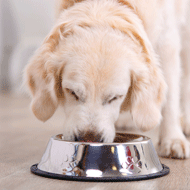Pet obesity on the rise, report finds

“Pet Obesity is a serious condition, which is now recognised as a disease among many health organisations."
New figures suggest pet obesity is on the rise, with over half of dogs now considered to be overweight or obese, according to vets.
The report, Pet Obesity Ten Years On, was published by the Pet Food Manufacturers Association.
Vets who took part in the survey felt that 51 per cent of dogs, 44 per cent of cats and 29 per cent of small mammals are now overweight or obese. The last PFMA report in 2014 showed 45 per cent of dogs, 40 per cent of cats and 28 per cent of small mammals were overweight.
All vets surveyed for the latest study said they were concerned about pet obesity.
Despite this, research carried out among 8,000 households found that 68 per cent of owners thought their pet was the perfect weight, while 67 per cent were not worried about pet obesity.
There was also a considerable mismatch in opinions about the cause of pet obesity, with 98 per cent of vets thinking excessive treating contributed to the problem, compared to only 41 per cent of owners. Similarly, 80 per cent of vets cited lack of exercise as a problem, but only 44 per cent of owners shared this view.
The findings were discussed at a gathering of MPs and animal welfare experts at the House of Commons.
Nicole Paley, deputy chief executive of the PFMA said: “Pet Obesity is a serious condition, which is now recognised as a disease among many health organisations.
“Over the last ten years, we are proud to have helped communicate the importance of healthy nutrition and dangers of obesity – to pet professionals and owners. However, the message is not getting through to pet owners - and we need to do more.”



 The veterinary mental health charity Vetlife is inviting the veterinary community to join it for a sponsored cold-water dip.
The veterinary mental health charity Vetlife is inviting the veterinary community to join it for a sponsored cold-water dip.